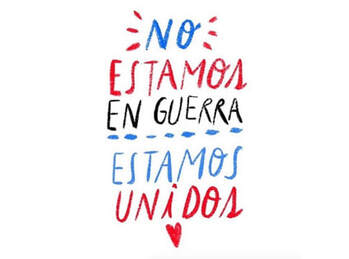We’re not at War, We’re United
On October 25th, 2020, Chileans voted overwhelmingly to call a constitutional convention to write a completely new constitution for their nation. For over 40 years, Chile has been governed by a constitution written behind closed doors during the Pinochet dictatorship.
The Pinochet dictatorship began with a C.I.A. backed coup on September 11th, 1973, that claimed the life of Chile’s democratically elected socialist President Salvador Allende. Among the many crimes of this dictatorship, at least 31,947 Chileans were tortured, according to Amnesty International. The dictatorship did not come to an end until 1990, when Chileans defeated the dictator through a popular referendum. Yet, the dictatorship era constitution has remained in effect for another 30 years. Its’ requirement for a two thirds majority in congress to pass legislation addressing public education, healthcare, and public pensions has long blocked reforms of dictatorship era laws. Chile’s new constitution will be the first constitution in Latin America to be written by at least 50 percent women, after a gender parity requirement was approved. Now, members of the Chilean senate are debating including dedicated seats for representatives of Indigenous peoples, such as the Mapuches, whose land claims and sovereignty have never been recognized by the Chilean state. Chileans voted by 78 percent to call the constitutional convention, and by 79 percent to make all current Chilean political office holders ineligible to participate in elections called for April 2021 to select delegates to the constitutional convention. Now, a diverse cast of religious leaders, academics, and celebrities, like Chilean rapper Ana Tijoux, are beginning their campaigns. Once elected, they will have less than a year to draft a new constitution before it is put to a referendum, with mandatory participation by all Chilean voters. The opportunity to replace the dictatorship era constitution did not come easily. Demands for a new constitution date back decades. Though former President Michelle Bachelet facilitated discussions on calling a constitutional convention during her administrations, it was not until the social uprisings ̶ known as the estallido social ̶ united Chileans in October 2019 that the issue gained the necessary momentum. Two successive rises in subway fare in October 2019 proved the last straw for many Chileans, sparking large scale protests that coincided with significant fire damage to 19 metro stations in Santiago de Chile on October 18th, 2019. In response, Chile’s conservative billionaire President Sebastian Piñera called a state of emergency and ordered the Chilean military to enforce what became a shoot to kill curfew in many cases, saying “We are at war with a powerful enemy.” Even as more than 30 Chileans were killed by the military in the following months and over 20,000 were hospitalized with wounds from military munitions according to Amnesty International, Chileans continued to march with crowds exceeding a million people at times in the capital Santiago, a city of over seven million people. As many took up the popular slogan “we’re not at war, we’re united,” President Piñera’s approval rating dropped to five percent, according to the president’s own polling firm. That’s how social movements created the political context for the president and the congress to concede to the long running popular demand for Chileans to replace their constitution and revitalize their democracy. Joshua graduated from UAA with a bachelor’s degree in Journalism and Public Communication in 2011. He worked as a public radio, multimedia and print journalist in Alaska. After taking his award-winning documentary, We Can’t Eat Gold, on tour to film festivals, Joshua moved to Santiago, Chile in 2015 to continue filming documentaries and practicing journalism, while also teaching English as a second language to policymakers, professionals and in semester-long university courses. His new Chilean feature-length documentary, Veins of Resistance, was world premiered on October 8th at the Workers Unite! Film Festival. |
